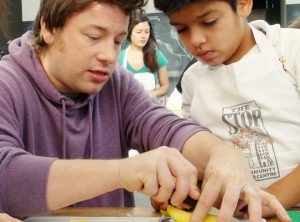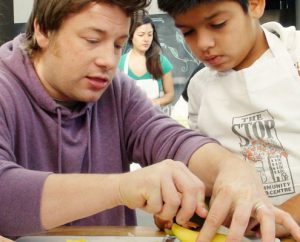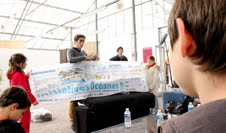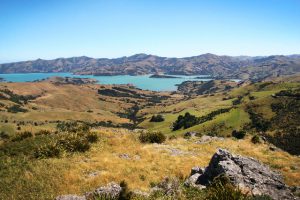MYOO interviewed him on the eve of the inaugural Food Revolution Day on 19 May 2012:
Chef and food activist Jamie Oliver is not one to mince words. From telling McDonalds to “f*ck off” on late night television to warning parents that “your child will live a life ten years younger than you because of the landscape of food that we’ve built around them,” he is refreshingly blunt in the face of a growing crisis – we’re not eating right and its ruining our health.
Jamie recently took a moment to answer a few of our questions about his upcoming worldwide day of action, Food Revolution Day. Set to launch on May 19th, the the goal is to bring people together, share cooking experience and knowledge, and help people start eating smarter. Never a dull interview, he touched on everything from the importance of teaching the next generation to cook to what he thinks of the government’s role in our diets and the atrocious amount of time we spend in front of the television.
On the Food Revolution Day website, it states: “For the first time in history, being overweight is killing more people than being underweight…This has to change, and it’s down to us. We need to get back to basics and start thinking about where our food comes from.” What is the connection between obesity and understanding “where our food comes from?”
For me, Food Revolution Day is all about food education. I’m so, so amazed and grateful to the people all over the world who are taking part because this is truly a global problem. Every day I’m seeing tweets from places like Saudi Arabia, Indonesia, Portugal and so many other countries so it’s clear that this is a problem which is affecting people everywhere. The connection is simple; the best way to demonstrate it is to think back to the Food Revolution television series on ABC and the sections where I ask high school students – kids of 13, 14, 15 – simple questions about food and they don’t know the answers. Like the guy who answered “Bears?” when I asked him where honey comes from. It was shocking, but it wasn’t his fault. For him, honey was just something which arrived in his house and tasted good. So if people don’t know the very basic information, how are they supposed to make informed choices about what to feed themselves?
Can you explain what you mean by “real food?” And how do you address the perception that local and organic products are only accessible to the wealthy?
Real food for me is fresh ingredients used to create beautiful, nutritious meals. Not pre-packaged food with ingredients you can’t pronounce and not take-away food every day or every other day. I’m not against take-away food completely because of course it has a role to play, but a big part of the problem is that for too many people, take-away food is no longer a treat, it’s the norm. Because they have no options. As for the other question, throughout history the least expensive products have always been the local ones but it depends where you shop. I’m constantly amazed when people say they can’t afford to eat fresh food because “it’s expensive” and then they’ll spend twice as much money on take-away pizza. I can make a better pizza for a third of the price.
Mark Bittman wrote in The New York Times that “it’s the farm bill that largely shapes [American] food and agriculture policy, and…ultimately supports the cynical, profit-at-any-cost food system that drives obesity, astronomical health care costs, ethanol-driven agriculture and more, creating further deficits while punishing the environment.” What do you think of this scathing critique of the American government’s food and agriculture policy?
I think Mark is right in much of what he writes, but my focus is very much on food education so that people can make informed choices and have the knowledge to feed themselves and their families better.
From banning trans fats to possibly restricting people in theSupplemental Nutrition Assistance Program from purchasing soda, there’s a lot of debate about the government’s role in people’s diets. As a healthy food advocate, do you believe in these restrictions or should the goal be to educate people and allow them to make their own decisions?
I understand when people say they don’t want governments “nannying” them, but when it comes to a global crisis like this, I think a bit of guidance is necessary. In the UK, the government’s answers to the problem of our topping the obesity statistics of Europe is essentially to say to people “it’s your fault – go and do some exercise and eat less,” which doesn’t help anyone. I think an amazing start would be to teach all our kids to cook throughout their schooling so that at least this generation has the basic life skill they need.
According to recent statistics, the average American watches 4 hours and 39 minutes of television per day, but most people also say they don’t have time to cook. How do you explain this disconnect?
There’s a huge argument to be made for linking obesity to television habits and you can read research stating that people eat more when they’re watching TV rather than eating at a table talking to their friends and families. But that’s an amazing statistic. It takes minutes to get a beautiful, nutritious meal on the table.
Anything else you’d like to add?
Just thanks to everyone for supporting Food Revolution Day all over the world!







